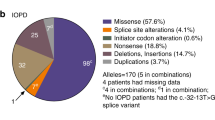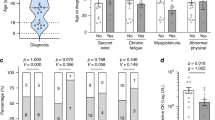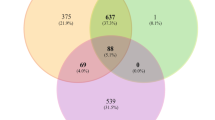Abstract
Newborn screening and therapies for Pompe disease (glycogen storage disease type II, acid maltase deficiency) will continue to expand in the future. It is thus important to determine whether enzyme activity or type of pathogenic genetic variant in GAA can best predict phenotypic severity, particularly the presence of infantile-onset Pompe disease (IOPD) versus late-onset Pompe disease (LOPD). We performed a retrospective analysis of 23 participants with genetically-confirmed cases of Pompe disease. The following data were collected: clinical details including presence or absence of cardiomyopathy, enzyme activity levels, and features of GAA variants including exon versus intron location and splice site versus non-splice site. Several combinations of GAA variant types for individual participants had significant associations with disease subtype, cardiomyopathy, age at diagnosis, gross motor function scale (GMFS), and stability of body weight. The presence of at least one splice site variant (c.546 G > C/p.T182 = , c.1076–22 T > G, c.2646 + 2 T > A, and the classic c.−32–13T > G variant) was associated with LOPD, while the presence of non-splice site variants on both alleles was associated with IOPD. Enzyme activity levels in isolation were not sufficient to predict disease subtype or other major clinical features. To extend the findings of prior studies, we found that multiple types of splice site variants beyond the classic c.−32–13T > G variant are often associated with a milder phenotype. Enzyme activity levels continue to have utility for supporting the diagnosis when the genetic variants are ambiguous. It is important for newly diagnosed patients with Pompe disease to have complete genetic, cardiac, and neurological evaluations.
This is a preview of subscription content, access via your institution
Access options
Subscribe to this journal
Receive 12 print issues and online access
$259.00 per year
only $21.58 per issue
Buy this article
- Purchase on Springer Link
- Instant access to full article PDF
Prices may be subject to local taxes which are calculated during checkout

Similar content being viewed by others
References
Martiniuk F, Mehler M, Pellicer A, Tzall S, La Badie G, Hobart C, et al. Isolation of a cDNA for human acid alpha-glucosidase and detection of genetic heterogeneity for mRNA in three alpha-glucosidase-deficient patients. Proc Natl Acad Sci USA. 1986;83:9641–4.
Pompe JC. Over idiopatische hypertrophie van het hart. Ned T Geneesk. 1932;76:304–11.
Hers HG. alpha-Glucosidase deficiency in generalized glycogenstorage disease (Pompe’s disease). Biochem J. 1963;86:11–6.
Holmes JM, Houghton CR, Woolf AL. A Myopathy Presenting in Adult Life with Features Suggestive of Glycogen Storage Disease. J Neurol Neurosurg Psychiatry. 1960;23:302–11.
Zellweger H, Brown BI, McCormick WF, Tu JB. A mild form of muscular glycogenosis in two brothers with alpha-1, 4-glucosidase deficiency. Ann Paediatr. 1965;205:413–37.
Goldstein JL, Young SP, Changela M, Dickerson GH, Zhang H, Dai J, et al. Screening for Pompe disease using a rapid dried blood spot method: experience of a clinical diagnostic laboratory. Muscle Nerve. 2009;40:32–36.
Gupta N, Kazi ZB, Nampoothiri S, Jagdeesh S, Kabra M, Puri RD, et al. Clinical and Molecular Disease Spectrum and Outcomes in Patients with Infantile-Onset Pompe Disease. J Pediatr. 2020;216:44–50 e45.
Wens SC, Kroos MA, de Vries JM, Hoogeveen-Westerveld M, Wijgerde MG, van Doorn PA, et al. Remarkably low fibroblast acid alpha-glucosidase activity in three adults with Pompe disease. Mol Genet Metab. 2012;107:485–9.
Van den Hout H, Reuser AJ, Vulto AG, Loonen MC, Cromme-Dijkhuis A, Van der Ploeg AT. Recombinant human alpha-glucosidase from rabbit milk in Pompe patients. Lancet. 2000;356:397–8.
Van den Hout JM, Kamphoven JH, Winkel LP, Arts WF, De Klerk JB, Loonen MC, et al. Long-term intravenous treatment of Pompe disease with recombinant human alpha-glucosidase from milk. Pediatrics. 2004;113:e448–7.
Kishnani PS, Nicolino M, Voit T, Rogers RC, Tsai AC, Waterson J, et al. Chinese hamster ovary cell-derived recombinant human acid alpha-glucosidase in infantile-onset Pompe disease. J Pediatr. 2006;149:89–97.
Winkel LP, Van den Hout JM, Kamphoven JH, Disseldorp JA, Remmerswaal M, Arts WF, et al. Enzyme replacement therapy in late-onset Pompe’s disease: a three-year follow-up. Ann Neurol. 2004;55:495–502.
van der Ploeg AT, Clemens PR, Corzo D, Escolar DM, Florence J, Groeneveld GJ, et al. A randomized study of alglucosidase alfa in late-onset Pompe’s disease. N Engl J Med. 2010;362:1396–406.
Kishnani PS, Hwu WL, and Pompe Disease Newborn Screening Working, G. Introduction to the Newborn Screening, Diagnosis, and Treatment for Pompe Disease Guidance Supplement. Pediatrics. 2017;140:S1–S3.
Chien YH, Hwu WL, Lee NC. Newborn screening: Taiwanese experience. Ann Transl Med. 2019;7:281.
Momosaki K, Kido J, Yoshida S, Sugawara K, Miyamoto T, Inoue T, et al. Newborn screening for Pompe disease in Japan: report and literature review of mutations in the GAA gene in Japanese and Asian patients. J Hum Genet. 2019;64:741–55.
Elder ME, Nayak S, Collins SW, Lawson LA, Kelley JS, Herzog RW, et al. B-Cell depletion and immunomodulation before initiation of enzyme replacement therapy blocks the immune response to acid alpha-glucosidase in infantile-onset Pompe disease. J Pediatr. 2013;163:847–54 e841.
Corti M, Elder M, Falk D, Lawson L, Smith B, Nayak S, et al. B-Cell Depletion is Protective Against Anti-AAV Capsid Immune Response: a Human Subject Case Study. Mol Ther Methods Clin Dev. 2014;1:14033.
Stockton DW, Kishnani P, van der Ploeg A, Llerena J Jr., Boentert M, Roberts M, et al. Respiratory function during enzyme replacement therapy in late-onset Pompe disease: longitudinal course, prognostic factors, and the impact of time from diagnosis to treatment start. J Neurol. 2020;267:3038–53.
den Dunnen, JT. Describing Sequence Variants Using HGVS Nomenclature. In: SJ White and S Cantsilieris, editors. Genotyping: Methods and Protocols. New York, NY: Springer New York; 2017. p. 243–51.
Winkel LP, Hagemans ML, van Doorn PA, Loonen MC, Hop WJ, Reuser AJ, et al. The natural course of non-classic Pompe’s disease; a review of 225 published cases. J Neurol. 2005;252:875–84.
Whitaker CH, Felice KJ, Natowicz M. Biopsy-proven alpha-glucosidase deficiency with normal lymphocyte enzyme activity. Muscle Nerve. 2004;29:440–2.
Temple JK, Dunn DW, Blitzer MG, Shapira E. The “muscular variant” of Pompe disease: clinical, biochemical and histologic characteristics. Am J Med Genet. 1985;21:597–604.
Potter JL, Robinson HB Jr., Kramer JD, Schafter IA. Apparent normal leukocyte acid maltase activity in glycogen storage disease type II (Pompe’s disease). Clin Chem. 1980;26:1914–5.
de Barsy T, Ferriere G, Fernandez-Alvarez E. Uncommon case of type II glycogenosis. Acta Neuropathol. 1979;47:245–7.
Bertagnolio B, Di Donato S, Peluchetti D, Rimoldi M, Storchi G, Cornelio F. Acid maltase deficiency in adults. Clinical, morphological and biochemical study of three patients. Eur Neurol. 1978;17:193–204.
Kroos MA, Van der Kraan M, Van Diggelen OP, Kleijer WJ, Reuser AJ, Van den Boogaard MJ, et al. Glycogen storage disease type II: frequency of three common mutant alleles and their associated clinical phenotypes studied in 121 patients. J Med Genet. 1995;32:836–7.
Reuser AJJ, van der Ploeg AT, Chien YH, Llerena J Jr., Abbott MA, Clemens PR, et al. GAA variants and phenotypes among 1,079 patients with Pompe disease: data from the Pompe Registry. Hum Mutat. 2019;40:2146–64.
Herzog A, Hartung R, Reuser AJ, Hermanns P, Runz H, Karabul N, et al. A cross-sectional single-centre study on the spectrum of Pompe disease, German patients: molecular analysis of the GAA gene, manifestation and genotype-phenotype correlations. Orphanet J Rare Dis. 2012;7:35.
Huie ML, Chen AS, Tsujino S, Shanske S, DiMauro S, Engel AG, et al. Aberrant splicing in adult onset glycogen storage disease type II (GSDII): molecular identification of an IVS1 (−13T->G) mutation in a majority of patients and a novel IVS10 (+1GT->CT) mutation. Hum Mol Genet. 1994;3:2231–6.
Laforet P, Nicolino M, Eymard PB, Puech JP, Caillaud C, Poenaru L, et al. Juvenile and adult-onset acid maltase deficiency in France: genotype-phenotype correlation. Neurology. 2000;55:1122–8.
van Capelle CI, van der Meijden JC, van den Hout JM, Jaeken J, Baethmann M, Voit T, et al. Childhood Pompe disease: clinical spectrum and genotype in 31 patients. Orphanet J Rare Dis. 2016;11:65.
Montalvo AL, Bembi B, Donnarumma M, Filocamo M, Parenti G, Rossi M, et al. Mutation profile of the GAA gene in 40 Italian patients with late onset glycogen storage disease type II. Hum Mutat. 2006;27:999–1006.
Alandy-Dy J, Wencel M, Hall K, Simon J, Chen Y, Valenti E, et al. Variable clinical features and genotype-phenotype correlations in 18 patients with late-onset Pompe disease. Ann Transl Med. 2019;7:276.
Kroos MA, Pomponio RJ, Hagemans ML, Keulemans JL, Phipps M, DeRiso M, et al. Broad spectrum of Pompe disease in patients with the same c.−32-13T->G haplotype. Neurology. 2007;68:110–5.
Herbert M, Case LE, Rairikar M, Cope H, Bailey L, Austin SL, et al. Early-onset of symptoms and clinical course of Pompe disease associated with the c.-32-13T>G variant. Mol Genet Metab. 2019;126:106–16.
Zampieri S, Buratti E, Dominissini S, Montalvo AL, Pittis MG, Bembi B, et al. Splicing mutations in glycogen-storage disease type II: evaluation of the full spectrum of mutations and their relation to patients’ phenotypes. Eur J Hum Genet. 2011;19:422–31.
Hermans MM, van Leenen D, Kroos MA, Beesley CE, Van Der Ploeg AT, Sakuraba H, et al. Twenty-two novel mutations in the lysosomal alpha-glucosidase gene (GAA) underscore the genotype-phenotype correlation in glycogen storage disease type II. Hum Mutat. 2004;23:47–56.
Kishnani PS, Hwu WL, Mandel H, Nicolino M, Yong F, Corzo D, Infantile-Onset Pompe Disease Natural History Study, G. A retrospective, multinational, multicenter study on the natural history of infantile-onset Pompe disease. J Pediatr. 2006;148:671–6.
Bali DS, Tolun AA, Goldstein JL, Dai J, Kishnani PS. Molecular analysis and protein processing in late-onset Pompe disease patients with low levels of acid alpha-glucosidase activity. Muscle Nerve. 2011;43:665–70.
Hahn A, Schanzer A. Long-term outcome and unmet needs in infantile-onset Pompe disease. Ann Transl Med. 2019;7:283.
Schoser B, Stewart A, Kanters S, Hamed A, Jansen J, Chan K, et al. Survival and long-term outcomes in late-onset Pompe disease following alglucosidase alfa treatment: a systematic review and meta-analysis. J Neurol. 2017;264:621–30.
Peng SS, Hwu WL, Lee NC, Tsai FJ, Tsai WH, Chien YH. Slow, progressive myopathy in neonatally treated patients with infantile-onset Pompe disease: a muscle magnetic resonance imaging study. Orphanet J Rare Dis. 2016;11:63.
Prater SN, Patel TT, Buckley AF, Mandel H, Vlodavski E, Banugaria SG, et al. Skeletal muscle pathology of infantile Pompe disease during long-term enzyme replacement therapy. Orphanet J Rare Dis. 2013;8:90.
Desai AK, Kazi ZB, Bali DS, Kishnani PS. Characterization of immune response in Cross-Reactive Immunological Material (CRIM)-positive infantile Pompe disease patients treated with enzyme replacement therapy. Mol Genet Metab Rep. 2019;20:100475.
Elmallah MK, Falk DJ, Nayak S, Federico RA, Sandhu MS, Poirier A, et al. Sustained correction of motoneuron histopathology following intramuscular delivery of AAV in pompe mice. Mol Ther. 2014;22:702–12.
Falk DJ, Mah CS, Soustek MS, Lee KZ, Elmallah MK, Cloutier DA, et al. Intrapleural administration of AAV9 improves neural and cardiorespiratory function in Pompe disease. Mol Ther. 2013;21:1661–7.
McCall AL, Stankov SG, Cowen G, Cloutier D, Zhang Z, Yang L, et al. Reduction of Autophagic Accumulation in Pompe Disease Mouse Model Following Gene Therapy. Curr Gene Ther. 2019;19:197–207.
Todd AG, McElroy JA, Grange RW, Fuller DD, Walter GA, Byrne BJ, et al. Correcting Neuromuscular Deficits With Gene Therapy in Pompe Disease. Ann Neurol. 2015;78:222–34.
Colella P, Sellier P, Costa Verdera H, Puzzo F, van Wittenberghe L, Guerchet N, et al. AAV Gene Transfer with Tandem Promoter Design Prevents Anti-transgene Immunity and Provides Persistent Efficacy in Neonate Pompe Mice. Mol Ther Methods Clin Dev. 2019;12:85–101.
Lim JA, Yi H, Gao F, Raben N, Kishnani PS, Sun B. Intravenous Injection of an AAV-PHP.B Vector Encoding Human Acid alpha-Glucosidase Rescues Both Muscle and CNS Defects in Murine Pompe Disease. Mol Ther Methods Clin Dev. 2019;12:233–45.
Han SO, Li S, Everitt JI, Koeberl DD. Salmeterol with Liver Depot Gene Therapy Enhances the Skeletal Muscle Response in Murine Pompe Disease. Hum Gene Ther. 2019;30:855–64.
Cagin U, Puzzo F, Gomez MJ, Moya-Nilges M, Sellier P, Abad C, et al. Rescue of Advanced Pompe Disease in Mice with Hepatic Expression of Secretable Acid alpha-Glucosidase. Mol Ther. 2020;28:2056–72.
Stok M, de Boer H, Huston MW, Jacobs EH, Roovers O, Visser TP, et al. Lentiviral Hematopoietic Stem Cell Gene Therapy Corrects Murine Pompe Disease. Mol Ther Methods Clin Dev. 2020;17:1014–25.
Corti M, Liberati C, Smith BK, Lawson LA, Tuna IS, Conlon TJ, et al. Safety of Intradiaphragmatic Delivery of Adeno-Associated Virus-Mediated Alpha-Glucosidase (rAAV1-CMV-hGAA) Gene Therapy in Children Affected by Pompe Disease. Hum Gene Ther Clin Dev. 2017;28:208–18.
Smith BK, Collins SW, Conlon TJ, Mah CS, Lawson LA, Martin AD, et al. Phase I/II trial of adeno-associated virus-mediated alpha-glucosidase gene therapy to the diaphragm for chronic respiratory failure in Pompe disease: initial safety and ventilatory outcomes. Hum Gene Ther. 2013;24:630–40.
Bodamer OA, Scott CR, Giugliani R, Pompe Disease Newborn Screening Working, G. Newborn Screening for Pompe Disease. Pediatrics. 2017;140:S4–S13.
Boentert M, Florian A, Drager B, Young P, Yilmaz A. Pattern and prognostic value of cardiac involvement in patients with late-onset pompe disease: a comprehensive cardiovascular magnetic resonance approach. J Cardiovasc Magn Reson. 2016;18:91.
Herbert M, Cope H, Li JS, Kishnani PS. Severe Cardiac Involvement Is Rare in Patients with Late-Onset Pompe Disease and the Common c.−32-13T>G Variant: implications for Newborn Screening. J Pediatr. 2018;198:308–12.
Acknowledgements
The authors thank Stephanie M. Salabarria, BHSc for help in accessing clinical and genetic data.
Author information
Authors and Affiliations
Corresponding author
Ethics declarations
Conflict of interest
Dr MAV was supported in part by an unrestricted educational fellowship from Sanofi Genzyme. Ms SLF reports no disclosures. Dr ZZ reports no disclosures. Dr MJG reports no disclosures. Dr BJB is a member of the Pompe Registry Scientific Advisory Board, and has received grant support from Sanofi Genzyme and Amicus Therapeutics. Dr PBK was the uncompensated grantee of the unrestricted fellowship from Sanofi Genzyme that supported Dr MAV. He has served as a consultant for AveXis and ChromaDex, and on an advisory board for Sarepta Therapeutics. This study was supported in part by an unrestricted educational fellowship from Sanofi Genzyme (2015–2017). Neither Sanofi Genzyme nor any individuals or organizations employed/contracted by Sanofi Genzyme participated in study design, data collection, data analysis, drafting of the paper writing, editing of the paper, or decision to submit this paper for publication.
Additional information
Publisher’s note Springer Nature remains neutral with regard to jurisdictional claims in published maps and institutional affiliations.
Rights and permissions
About this article
Cite this article
Viamonte, M.A., Filipp, S.L., Zaidi, Z. et al. Phenotypic implications of pathogenic variant types in Pompe disease. J Hum Genet 66, 1089–1099 (2021). https://doi.org/10.1038/s10038-021-00935-9
Received:
Revised:
Accepted:
Published:
Issue Date:
DOI: https://doi.org/10.1038/s10038-021-00935-9
This article is cited by
-
Beyond Sarcomeric Hypertrophic Cardiomyopathy: How to Diagnose and Manage Phenocopies
Current Cardiology Reports (2022)



